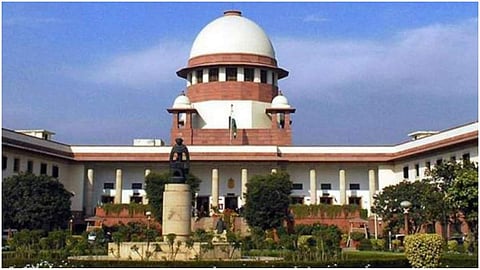

The Supreme Court, on October 8, directed the Delhi government to come up with a plan to help children of Economically Weaker Section (EWS) category and disadvantaged groups during the pandemic for their online classes. The SC directed that the Centre and Delhi should work together to find a solution to ensure that education is not denied due to lack of resources.
A Bench of Justices DY Chandrachud and BV Nagarathna said that it is necessary for the Delhi government to come up with a plan to uphold the objective of the Right to Education (RTE) Act and the Centre must also coordinate with the State Government and share concurrent responsibilities for the purposes of funding for resources. "Digital divide produced stark consequences during the pandemic as the right to education was virtually denied to children belonging to the EWS category as they could not afford computers for online classes," the Bench said, while suggesting that the government must provide the facilities. It said the need to provide adequate computer-based equipment together with internet access for online learning is of "utmost importance".
"The needs of young children who are the future of the country cannot be ignored; access to online education to EWS and disadvantaged groups of children cannot be denied," the apex court said. The Delhi High Court last year had directed private unaided schools and government schools like Kendriya Vidyalayas to supply gadgets and internet packages to students from EWS and disadvantaged groups to facilitate their learning online.
The High Court had directed that the cost of gadgets and internet packages are not a part of tuition fee and have to be provided free of cost to these students by the schools, subject to the right of private unaided schools to claim reimbursement from the state in accordance with the provision of the Right of Children to Free and Compulsory Education Act, 2009. The Bench today was hearing a plea by the Action Committee Unaided Recognized Private Schools which said that it is difficult for schools to comply with the High Court's direction because it has put the burden on them financially.
The Action Committee said that the government has to reimburse them for the computer and internet access for online classes and they need funding for the same. The top court issued a notice in the matter and tagged it along with the pending appeals filed by the Central Government and the Delhi government against the order of the Delhi High Court.
Justice Nagarathna said that state governments have to come forward and finance online classes, else children will drop out of school. "In a pandemic situation, this has to be taken seriously," the Bench added. "Look at the tribal and rural areas, there is a large dropout of children from schools," Justice Nagarathna said. Hearing the plea, Justice Chandrachud asked, "What is the Delhi government doing? Mr Shyam Divan (appearing for the petitioner) is saying that the burden is falling on private schools and just because parents are not EWS does not mean they can pay the fees."
The Bench even suggested that the government can tap into the Corporate Social Responsibility (CSR) funds of corporates for this. Justice Chandrachud further said, "I have seen this at personal quarters, it's heart-wrenching. We are merging EWS with mainstream and, on the other hand,, there is such disparity. The mother is a maid and the father is a driver. Where will they get the laptop from? You have to upload homework on the laptop."
The Bench took into note that the High Court had directed that private unaided and government schools must, under the RTE Act 2009, supply the gadgets and internet packages to EWS and disadvantaged groups free of cost, subject to being reimbursed by the State. It then asked the top court's registry to seek Chief Justice of India's permission so that all these appeals can be listed at an early date before an appropriate Bench so that a workable solution can be carved out for providing education to younger citizens of India.
